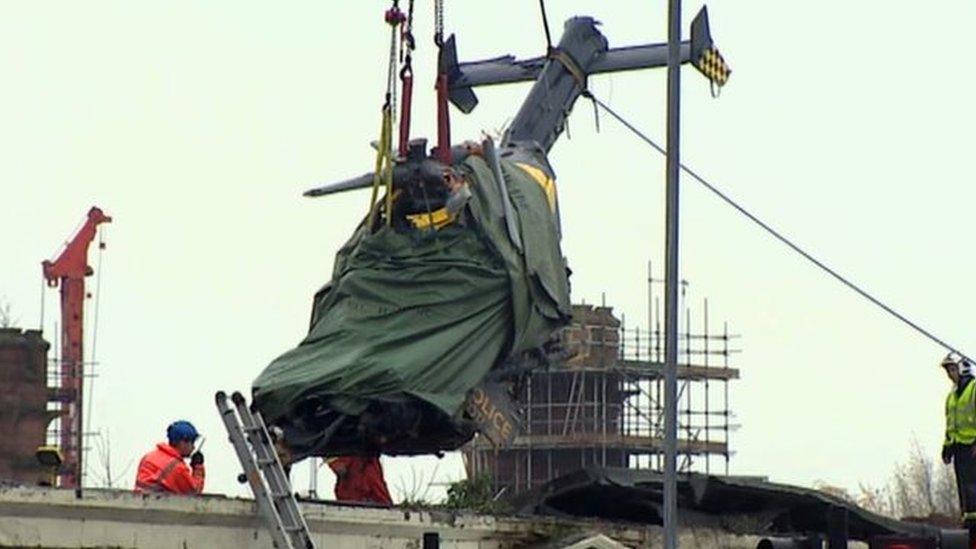Clutha crash: Inquiry says pilot 'took a chance' to ignore fuel warnings
- Published
New footage from the Crown Office shows the aftermath of the helicopter crash
An inquiry into the Clutha helicopter crash has found that the pilot "took a chance" and ignored low fuel warnings.
Sheriff Principal Craig Turnbull said the tragedy happened because Captain David Traill had ignored the five warnings he received during the flight.
He said that was a "conscious decision" which had "fatal consequences" for the 10 people who died.
The police helicopter crashed into the roof of the busy Glasgow bar at 22:22 on 29 November 2013.
The tragedy claimed the lives of the pilot, his two crew members and seven customers in the pub.
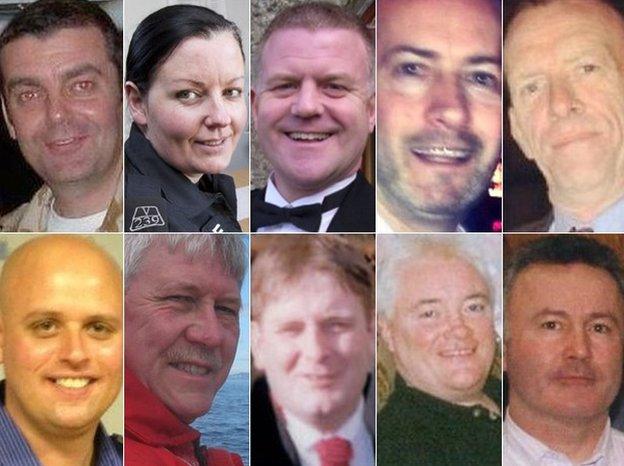
(Top: L to R) David Traill, PC Kirsty Nelis, PC Tony Collins, Gary Arthur, Samuel McGhee (Bottom: L to R) Colin Gibson, Robert Jenkins, Mark O'Prey, John McGarrigle, Joe Cusker
Those who died were Capt Traill, 51; PC Tony Collins, 43; PC Kirsty Nelis, 36, and customers Gary Arthur, 48; Joe Cusker, 59; Colin Gibson, 33; Robert Jenkins, 61; John McGarrigle, 58; Samuel McGhee, 56; and Mark O'Prey, 44. Another 31 people were injured.
Mr O'Prey's father Ian said he was "really angry" at the inquiry's findings and that Capt Traill had been made "a fall guy".
The Clutha's owner, Alan Crossan, also expressed "shock and disappointment" at the report and how "brutal" it had been towards Capt Traill.
He said questions remained over the reasons why the pilot had ignored the low fuel warnings.
During the fatal accident inquiry, Sheriff Turnbull heard testimony from families, experts and eyewitnesses.
In his findings, external, he said there was "no doubt" that the crash had happened because the helicopter's engines "flamed out" due to a lack of fuel.
The fuel supply tanks had been depleted because Capt Traill had failed to ensure that at least one of the aircraft's fuel transfer pump switches was on.
"The central question for the inquiry is why did that happen?" said Sheriff Turnbull.
"The answer is a simple one. Capt Traill ignored the low fuel warnings he received."
Clutha helicopter crash: how the events unfolded
He said the accident would not have happened if the pilot had followed the normal procedure for dealing with low fuel warnings.
The Pilot's Checklist stipulated that he should land the aircraft within 10 minutes of a fuel warning.
The sheriff described Capt Traill's failure to follow that procedure as "inexplicable".
He said: "Capt Traill took a chance that the low fuel warnings he received were erroneous.
"That was a conscious decision on his part. It was a decision that had fatal consequences for 10 people."
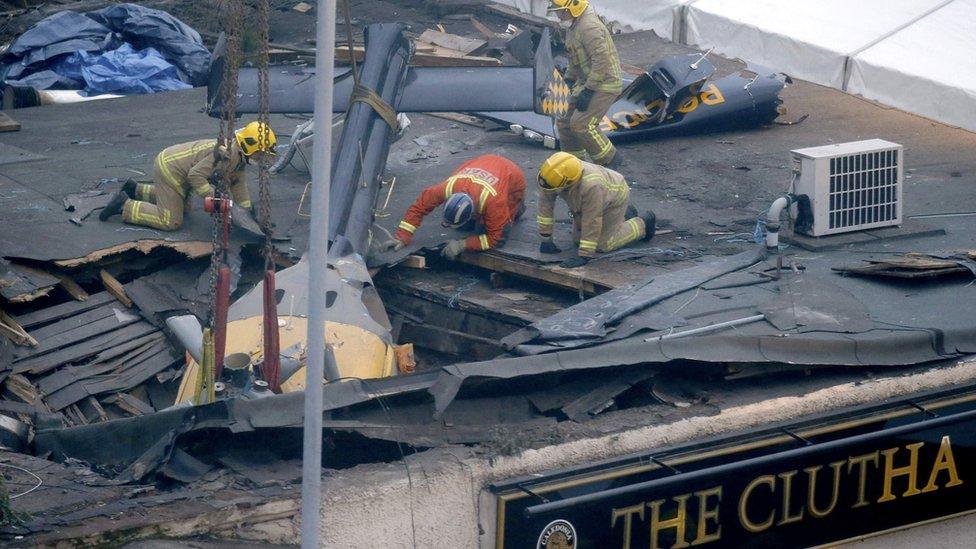
Sheriff Turnbull also said that the Eurocopter EC135, manufactured by Airbus, should have had a visible and audible warning which would activate when both fuel transfer pumps had been switched off.
The pumps, which were both switched off during the flight, supplied fuel from the main tank to the helicopter's twin engines.
Sheriff Turnbull said: "The circumstances of the accident are so unusual that it is improbable they will be repeated, even without the introduction of the safety actions taken since the accident."
He added that the tragedy "changed forever the lives of many people" and praised the dignity of those who attended the 32-day inquiry.
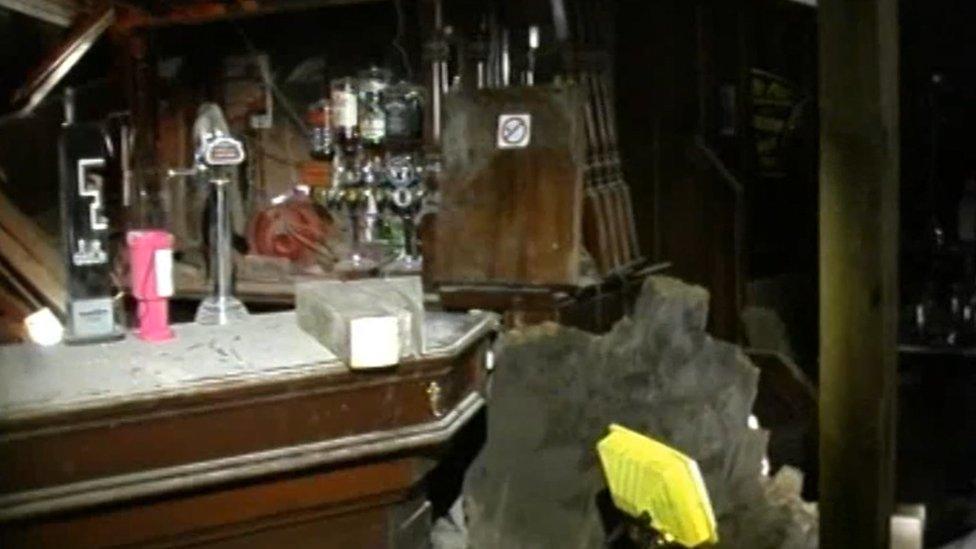
More than 100 people were inside the bar at the time of the crash
Sheriff Turnbull noted it was "surprising" that it took two years from the 2015 publication of the Air Accidents Investigation Branch (AAIB) report on the crash to confirm that there would be no criminal proceedings.
He added: "It took far too long to lodge a notice of inquiry in this case."
Sheriff Turnbull also said the Crown Office's Helicopter Incidents Investigation Team were "not sufficiently resourced" to enable the FAI to start sooner.
He added that an FAI into the deaths caused by the Sumburgh helicopter crash in August 2013 was still to be held.
'Deeply saddened'
A Crown Office spokesperson said: "This was an exceptionally complex and challenging investigation and the Crown acknowledges that the time taken from the tragedy occurring to convening the inquiry was longer than desirable, and that this compounded the distress suffered by bereaved relatives."
The spokesperson said additional funding had been made available to recruit additional staff, and that improvements were being made.
A spokesman for the aircraft's manufacturer, Airbus Helicopters, said it was "deeply saddened by this tragic accident and the heavy loss of life".
"We took immediate action to understand the root cause and we have taken note of the findings of both the AAIB and FAI," he said.
"The safety of our fleet remains our number one priority and we are committed to doing everything possible to ensure the safe operation of our helicopters."

Clutha timeline
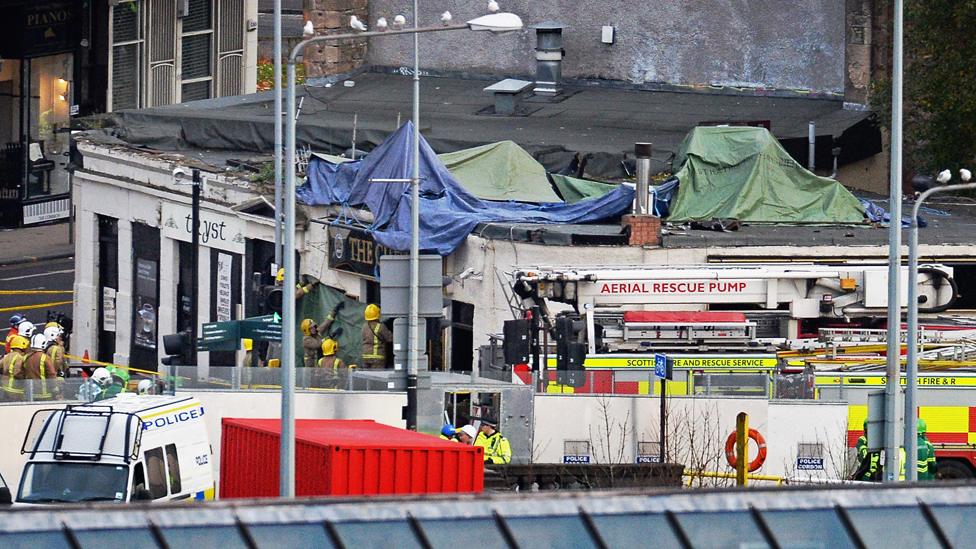
29 November 2013: A police helicopter crashes onto the Clutha bar in Glasgow, killing 10 people
9 December 2013: AAIB preliminary report finds no evidence of a "major" engine or gearbox failure, and says there was 95 litres of fuel on board the aircraft
14 February 2014: An AAIB special report finds both engines "flamed out" but does not pinpoint the cause
23 October 2015: The AAIB's final report finds the main cause of accident to be mismanagement of the fuel system by the pilot
24 November 2017: Fatal accident inquiry announced
8 April 2019: Fatal accident inquiry begins at Hampden Stadium in Glasgow
- Published29 November 2023
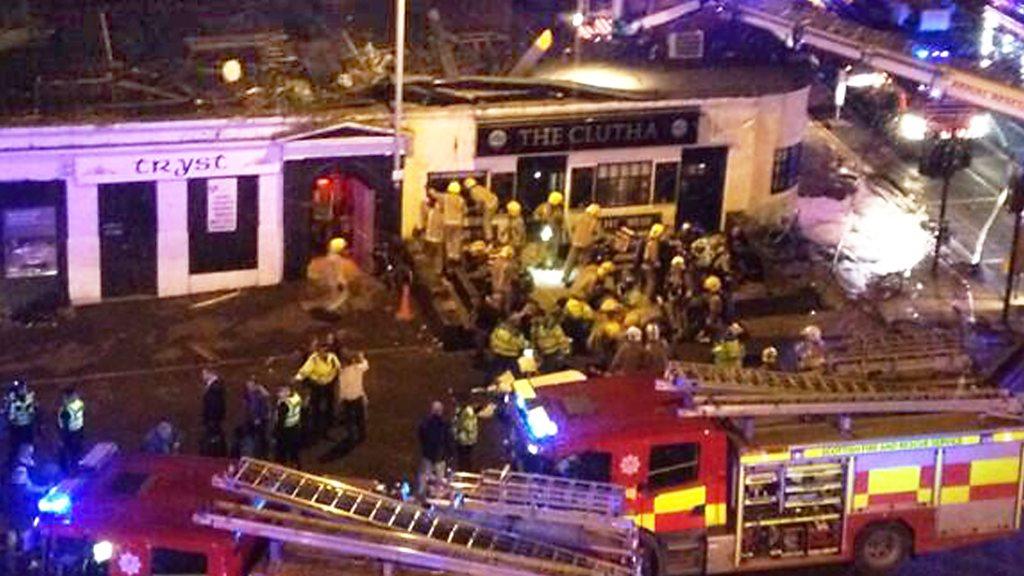
- Published10 April 2019
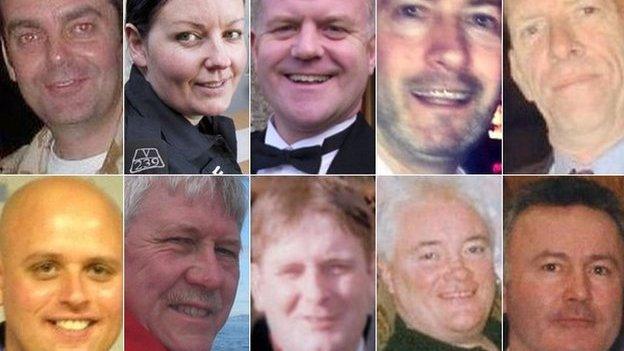
- Published8 April 2019
